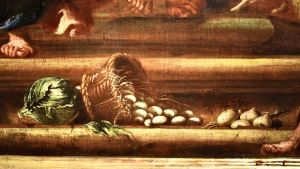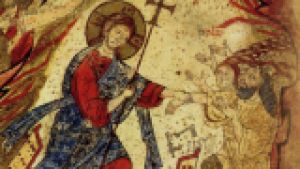
Teresa Girolami
Teresa Girolami è laureata in Materie letterarie e Teologia. Ha pubblicato vari testi, fra cui: "Pellegrinaggio del cuore" (Ed. Piemme); "I Fiammiferi di Maria - La Madre di Dio in prosa e poesia"; "Tenerezza Scalza - Natura di donna"; co-autrice di "Dialogo e Solstizio".
Readiness and conversion in following the Gospel
The liturgy of the Word highlights the figure of John the Baptist, prophet of the desert, who came to prepare the way for the Lord—proclaiming the coming of the Kingdom and exhorting people to bear fruits worthy of conversion.
Francis, a name chosen by Providence (his mother had named him John when he went from being a son of wrath to a son of Grace), became a preacher of baptism of repentance for the forgiveness of sins immediately after encountering Christ.
Starting with his friars, he exhorted everyone to prepare the way for the Lord who is coming.
"And Francis, hearing that the disciples should possess neither gold nor silver [...] nor two tunics, but only preach the Kingdom of God and penance [...] the holy father hastened [...] to carry out the salutary admonition; he could not bear any delay in faithfully putting into practice what he had heard: he took off his shoes, abandoned his staff, contented himself with a single tunic, and replaced his belt with a rope" (FF 356).
And, like a voice crying in the wilderness, he undertakes to straighten the paths for the Lord, starting with his brotherhood and then extending to the whole people.
In his Letter to the Faithful, like a new John, he calls for every mountain of concupiscence to be levelled.
We read:
"See, O blind ones, deceived by our enemies, that is, by the flesh, the world and the devil, that it is sweet for the body to sin and bitter to serve God, for all evil things, vices and sins come out of and proceed from the heart of men, as the Lord says in the Gospel.
And so you possess nothing in this world or in the next.
You think you possess the vanities of this age for a long time, but you are deceived, because the day and hour will come that you do not think, do not know and ignore" (FF 204).
Therefore, according to the Prophet: «Prepare the way of the Lord» (Mt 3:3).
Second Advent Sunday (year A) (Mt 3:1-12)
Seeing the large crowd following him, Jesus emphasises the need to pray for more workers in his harvest to announce the Kingdom and heal the sick, in the sign of gratuity.
In the Sources we find different passages referring to the proclamation of the Kingdom of God and its Gratuity by Francis and his brothers. We read in fact:
"His speeches were not vain, but filled with the power of the Holy Spirit: they penetrated to the depths of the heart and aroused great amazement in his listeners.
In each of his sermons, at the beginning of the discourses, he greeted the people with the greeting of peace, saying: «May the Lord give you peace!»
He had learnt this form of greeting by revelation from the Lord.
Like the prophets, he announced peace, he preached salvation' (FF 1052).
But it is surprising to find episodes that highlight his naked gratuitousness, received and returned.
"Francis, a man of God, naked of the things of the world, consecrated himself to divine worship and, no longer minding his own advantage, committed himself to serving God in every possible way.
On his way back to the church of St Damian, he began to walk through squares and streets, raising praises to the Lord.
As he finished his praises, he worked to obtain the stones needed to restore the church.
He said: «Whoever gives me one stone will have one reward; whoever gives me two stones, two rewards; whoever gives me three, as many rewards!» (FF 1420).
Moreover: "One winter morning, while he was praying covered in miserable garments, his carnal brother, passing by him, remarked ironically addressing a fellow citizen:
Tell Francis to sell you at least a penny of his sweat!".
The man of God, hearing the mocking words, was seized with superhuman joy and replied in French:
«I will sell this sweat, and very dearly, to my Lord» (FF 1424).
Saturday 1st wk. in Advent (Mt 9,35-38-10,1.6-8)
In today's Gospel, the healing of the two blind men highlights the theme of the inner blindness of the ambitious disciples, correlated with deep faith.
Francis was convinced that this is not witnessed with fine words, but with the eloquence of deeds.
In his Testament - for example - the Servant of God emphasises all this.
In fact, in that precious document we find a succession of expressions that emphasise the 'believing' of a grateful Francis, capable of shrouding in silence even the faults he saw in his community.
We read:
"And the Lord gave me such faith in the churches" (FF 111).
"The Lord gave me [...] such great faith in priests" (FF 112).
Even more faith he had in the Word, the bearer of inner healing.
In fact, on the basis of this, many healings took place in the same community of brothers, afflicted, at times, by various forms of blindness, before which Francis expressed himself thus:
"And all the brothers, who are aware of the sin of him [...] keep the sin of their brother very secret, because it is not the healthy who need the doctor, but the sick" (FF 237).
This was the evangelical logic adopted by the community of Francis, who, invested by the Spirit, healed every brother who transgressed.
"The Saint hated pride, the origin of all evil, and disobedience its worst daughter.
He welcomed, however, those who humbly repented.
Once a monk, who had transgressed the commands of obedience, was presented to him so that he might correct him with the magisterial chastisement.
But the man of God noticed from clear signs that this friar was sincerely repentant and therefore felt inclined to be lenient with him, for the sake of his humility.
However, lest the ease of forgiveness be an incentive for others to fail, he commanded that the friar's hood be removed and thrown into the flames, so that all might observe how much and what vengeance transgression against obedience demands.
And after the hood had remained a good while in the fire, he ordered it to be removed from the flames and given back to the humble and repentant friar.
Marvel: the hood had no sign of burning!
So it came to pass that by this miracle alone God exalted the power of the Saint and the humility of the repentant friar" (FF 1116).
Friday 1st wk. in Advent (Mt 9,27-31)
«You too will experience what is reserved». Franciscan Advent
Christ the King: Throne of the Cross and Jesus mocked, Herald
All Saints, like burning coals. And the ultimate Day
Pharisee, Publican: presumption and contempt, humility and Justification
Familiarity at the human level makes it difficult to go beyond this in order to be open to the divine dimension. That this son of a carpenter was the Son of God was hard for them to believe. Jesus actually takes as an example the experience of the prophets of Israel, who in their own homeland were an object of contempt, and identifies himself with them (Pope Benedict)
La familiarità sul piano umano rende difficile andare al di là e aprirsi alla dimensione divina. Che questo Figlio di un falegname sia Figlio di Dio è difficile crederlo per loro. Gesù stesso porta come esempio l’esperienza dei profeti d’Israele, che proprio nella loro patria erano stati oggetto di disprezzo, e si identifica con essi (Papa Benedetto)
These two episodes — a healing and a resurrection — share one core: faith. The message is clear, and it can be summed up in one question: do we believe that Jesus can heal us and can raise us from the dead? The entire Gospel is written in the light of this faith: Jesus is risen, He has conquered death, and by his victory we too will rise again. This faith, which for the first Christians was sure, can tarnish and become uncertain… (Pope Francis)
These two episodes — a healing and a resurrection — share one core: faith. The message is clear, and it can be summed up in one question: do we believe that Jesus can heal us and can raise us from the dead? The entire Gospel is written in the light of this faith: Jesus is risen, He has conquered death, and by his victory we too will rise again. This faith, which for the first Christians was sure, can tarnish and become uncertain… (Pope Francis)
The ability to be amazed at things around us promotes religious experience and makes the encounter with the Lord more fruitful. On the contrary, the inability to marvel makes us indifferent and widens the gap between the journey of faith and daily life (Pope Francis)
La capacità di stupirsi delle cose che ci circondano favorisce l’esperienza religiosa e rende fecondo l’incontro con il Signore. Al contrario, l’incapacità di stupirci rende indifferenti e allarga le distanze tra il cammino di fede e la vita di ogni giorno (Papa Francesco)
An ancient hermit says: “The Beatitudes are gifts of God and we must say a great ‘thank you’ to him for them and for the rewards that derive from them, namely the Kingdom of God in the century to come and consolation here; the fullness of every good and mercy on God’s part … once we have become images of Christ on earth” (Peter of Damascus) [Pope Benedict]
Afferma un antico eremita: «Le Beatitudini sono doni di Dio, e dobbiamo rendergli grandi grazie per esse e per le ricompense che ne derivano, cioè il Regno dei Cieli nel secolo futuro, la consolazione qui, la pienezza di ogni bene e misericordia da parte di Dio … una volta che si sia divenuti immagine del Cristo sulla terra» (Pietro di Damasco) [Papa Benedetto]
And quite often we too, beaten by the trials of life, have cried out to the Lord: “Why do you remain silent and do nothing for me?”. Especially when it seems we are sinking, because love or the project in which we had laid great hopes disappears (Pope Francis)
E tante volte anche noi, assaliti dalle prove della vita, abbiamo gridato al Signore: “Perché resti in silenzio e non fai nulla per me?”. Soprattutto quando ci sembra di affondare, perché l’amore o il progetto nel quale avevamo riposto grandi speranze svanisce (Papa Francesco)
The Kingdom of God grows here on earth, in the history of humanity, by virtue of an initial sowing, that is, of a foundation, which comes from God, and of a mysterious work of God himself (John Paul II)
duevie.art
don Giuseppe Nespeca
Tel. 333-1329741
Disclaimer
Questo blog non rappresenta una testata giornalistica in quanto viene aggiornato senza alcuna periodicità. Non può pertanto considerarsi un prodotto editoriale ai sensi della legge N°62 del 07/03/2001.
Le immagini sono tratte da internet, ma se il loro uso violasse diritti d'autore, lo si comunichi all'autore del blog che provvederà alla loro pronta rimozione.
L'autore dichiara di non essere responsabile dei commenti lasciati nei post. Eventuali commenti dei lettori, lesivi dell'immagine o dell'onorabilità di persone terze, il cui contenuto fosse ritenuto non idoneo alla pubblicazione verranno insindacabilmente rimossi.



















